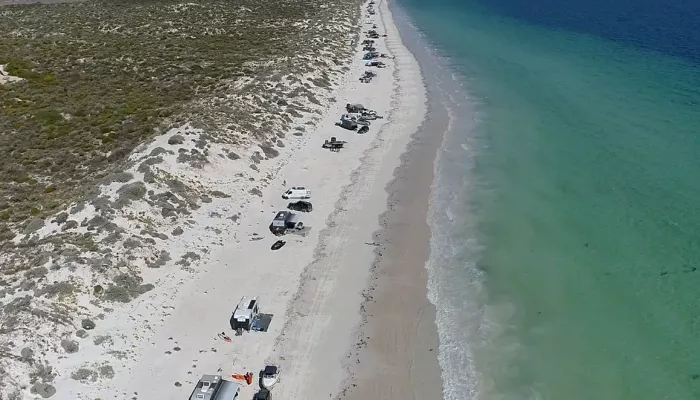Camping will be prohibited at a popular beach destination on South Australia’s York Peninsula starting in February 2025, as authorities take action to safeguard the area’s delicate environment from the growing impact of off-road vehicles and large camping setups.
Wauraltee Beach, including the renowned Second Beach area, will no longer permit overnight camping from February 3, 2025, according to a recent announcement from the state’s Department for Environment and the Northern and Yorke Landscape Board. This move comes in response to the rising popularity of 4WD vehicles, which have contributed to significant environmental concerns, including erosion, pollution, and damage to native wildlife habitats.
The decision is also supported by the Yorke Peninsula Council and local community leaders, who have expressed concern over the environmental strain caused by an increasing number of vehicles and campers. Social media has further exacerbated the problem, with “secret spots” being widely shared online, leading to unsustainable levels of foot traffic and vehicle use at previously quiet locations.
Addressing Environmental and Safety Concerns
Officials clarified that this ban will not extend to all beaches across South Australia. Jason Irving, National Parks Programs Director for the National Parks and Wildlife Service, emphasized that the government is focused on finding a balance between allowing public access and protecting the natural landscape.
“There is no intention to ban all vehicles from state beaches,” Irving explained. “The challenge lies in managing large camping vehicles that are being driven onto the beach in mass numbers, often with the intent to stay overnight. This creates significant environmental pressures.”
While vehicle access for daytime activities, including boat launching and recreational use, will remain unaffected, the ban on overnight camping is aimed at reducing the number of vehicles on the beach during peak periods, such as holidays and long weekends, when hundreds of campers gather. This surge in visitors has raised safety concerns, particularly for families with young children, as well as additional pressure on already vulnerable ecosystems.
Impact on Wildlife and Ecosystem
Environmental experts have raised alarm over the disruption to wildlife, including several endangered bird species, such as the fairy tern, eastern curlew, and hooded plover. The damage to sand dunes and coastal vegetation is also a major concern, as vehicle traffic compacts the soil, hampers the natural distribution of plant life, and increases the risk of sand drift and erosion.
The Department for Environment highlighted that vehicles can also introduce invasive plant species through tyre tracks, which further degrade the environment. Additionally, the presence of large vehicles and campers has led to the destruction of cultural sites and artifacts, exacerbating the environmental toll.
“Wauraltee Beach is a special place, but if we allow it to continue to be overrun by vehicles, it won’t remain that way for future generations,” Irving said.
Community Outreach and Enforcement
To ensure a smooth transition, the government plans to install new signage at Wauraltee Beach, informing visitors of the upcoming changes. Educating the public on the environmental importance of these regulations will be a priority, with park wardens instructed to approach compliance with fairness and reason.
While some have expressed concerns over the new rules, officials stress that the goal is to protect both the beach’s natural beauty and its fragile ecosystems, ensuring that Wauraltee Beach remains a destination that can be enjoyed for years to come without compromising its integrity.
The ban on overnight camping at Wauraltee Beach marks a growing trend of environmental preservation efforts at Australian coastal regions, as authorities take steps to curb the harmful effects of excessive human activity on fragile ecosystems.
Related topics
- Watersports Wetsuit Market Set to Reach USD XX.X Billion by 2031
- Sports Medicine Devices Market to Reach $11 Billion by 2028
- Board of the World Launches Tool to Simplify Snowboard Shopping

